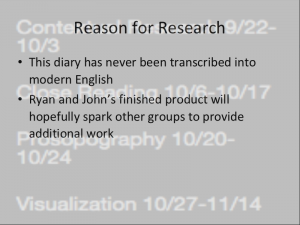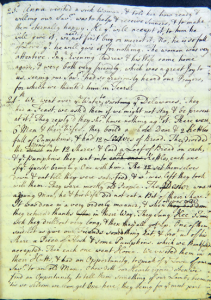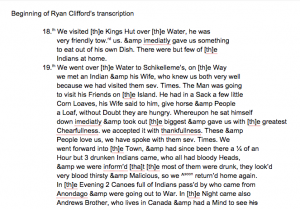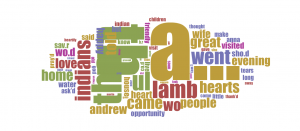John and I knew fairly early on in the semester what we were going to do for our final project. We were informed that the Mack Diaries documents were available on the class website, and what really intrigued us was that they had never before been transcribed. All semester long, Professor Faull has been telling us that the work we have been doing in this class is groundbreaking, and to have an opportunity to contribute something entirely new to the Internet was very exciting. The Mack Diaries were conserved over the years but nobody knew anything about its content because it had not been transcribed into language that is more easily understood. This then prompted us to contemplate what would happen if we decided to transcribe the Mack Diaries and then convert it into a TEI file for future publication, thus making it available to the public on the Internet for Bucknell University to see. Would people use the different methods of digital humanities that we learned in class such as visualization and close reading to represent the Mack Diaries in other ways using our transcription? Providing a resource for people was what we chose to focus on, and hopefully people do so in the future.

As a result of taking this course and completing the final project, I gained a new perspective on history. When I wrote my first blog post, I didn’t really understand any of the projects that were on the database or what they could be used for. This subject of digital humanities was entirely new to me and it opened my eyes to how advanced technology has helped to represent history in so many different ways that I wasn’t aware of. Scholars have made it easier for others to learn about history rather than simply reading a textbook or ancient document. Although the artifacts lose a little bit of their authenticity when put into a digital format, it would benefit more people if these artifacts were made available on the Internet.

The process of our project was long and required several steps to complete and ensure perfection. Since we were going to be publishing it on the internet, we had to make sure that there were no mistakes in either the transcription of the Mack Diaries or in the TEI file when we marked it up. The diary was compiled of 23 pages, and so John transcribed the first 12 pages and I was assigned to the last 11 pages, combining them in one shared Google document. I transcribed my portion over a span of two days, spending about four hours straight per day doing so. My transcription was a lot more accurate than when I transcribed the Powell Diary because this time around I was able to identify thorns and incorporate strikethroughs and superscripts. Therefore, I was able to work a lot faster, especially because I had several more pages to transcribe. John and I then reviewed each other’s transcriptions, making sure that we both formatted it correctly and that the language was uniform throughout the entire diary. We then copied the document into Oxygen and marked it up for dates, places, roles, traits, states, affiliations, events, objects and language. This process again took a very long time to do and required diligence and focus to make sure I was consistent with my tags and careful to get every one. Again, this process was a lot easier the second time around because the previous time I wasn’t paying attention to closing tags and left mistakes everywhere, and so I made sure to keep it clean as I went along. Last Monday we gave a short presentation updating the class on what we were doing. We had practically finished the TEI mark-up and planned to meet with Dr. Jakacki and Professor Faull to discuss the publication process. The two took care of the publishing, thus concluding our project.

What I enjoyed about doing this project was the collaborative aspect to it. John and I are friends and work well together, so we were always asking each other questions in order to stay consistent with each other and we didn’t hesitate to ask for help. John works very diligently and fast so I could always count on him. We worked well as a team because he always took initiative and I was there to look things over and offer any comments or criticisms. John and I both wanted this project to be the best it could be, so we worked hard to produce the same high quality work.

The process was smooth for the most part, however; John and I encountered a few problems along the way. At first, we struggled with developing a research question. We were interested in the content of the Mack Diaries, but that couldn’t be all we were trying to convey. We then decided that we wanted to inspire others to expand on the Mack Diaries, so our research question became what projects can emerge from our publication? Secondly, the transcription process went well, but when we copied and pasted the Google document into Oxygen we noticed that the strikethroughs and superscripts did not transfer over. We then decided to just delete the strikethroughs and leave the superscripts as just normal text, but when we met with Professor Faull and Dr. Jakacki, we realized that if we were to do this, then the Mack Diaries would not be totally accurate when we publish it because there could have been an editor after Martin and Anna Mack wrote it. After learning how to do the superscripts on Oxygen, John and I went back and incorporated the superscripts and the two professors did the same with strikethroughs. Therefore, the published version will show up with superscripts and strikethroughs. It took more time to do this but it was worth it to publish a perfect edition of the Mack Diaries.

Overall, I learned a lot about the endless possibilities that are associated with digital humanities. My project was just a glimpse of what you can do with history nowadays and how you can expand on other projects, and this was even seen on the day of presentations when Qijing Zheng and Jiayu Huang showed us how they were comparing the writing styles of Martin Mack and Joseph Powell.
Bibliography